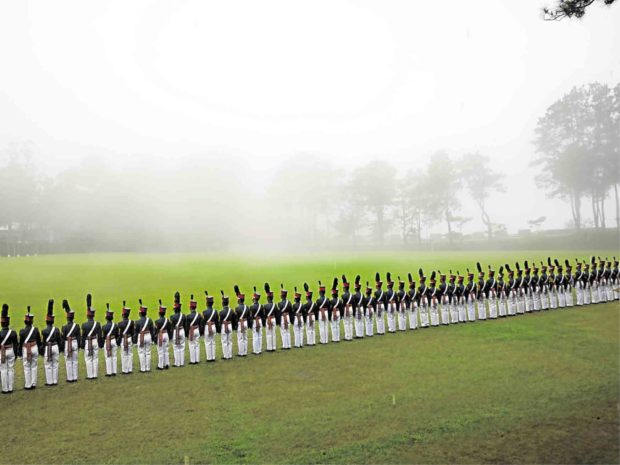
LONG GRAY LINE Members of Philippine Military Academy (PMA) “Mabalasik” Class of 2019 join the long gray line of military officers who finished their training at the PMA, the country’s leading military training institution. —EV ESPIRITU
FORT DEL PILAR, BAGUIO CITY, Philippines — Brand-new equipment, refurbished facilities and a revised curriculum will ensure that the Philippine Military Academy (PMA) continues to deliver quality education and training to future leaders of the Armed Forces of the Philippines, Lt. Gen. Ronnie Evangelista, PMA superintendent, said.
In remarks during Sunday’s graduation of the PMA “Mabalasik” Class of 2019, Evangelista cited the newly renovated Regis Hall that, he said, would give relief to cadets now living in congested quarters.
The renovation that replaced the three-story hall named after the late Lt. Leopoldo Regis, topnotcher of PMA Class 1951, cost the government P335 million.
Quality education
Evangelista said the PMA established an electronic library and an online database for its faculty and cadets to efficiently use digitized collection of books and other reference materials.
The academy also upgraded its firing range by adding a simulated moving automated random target system and an arm simulation laboratory.
Apart from the new equipment and facility, the PMA also revised its curriculum to add a Bachelor of Science in National Security Management. The new program was inspired by the 2017 Marawi siege that claimed the lives of civilians and soldiers and destroyed property.
REUNION PMA valedictorian Dionne Mae Umalla reunites with her father, Reuben, during her graduation on Sunday. —EV ESPIRITU
“We will commit to do this (deliver quality education and training) to the next cadets as PMA continues to produce intervention measures to cope with the changing times,” Evangelista said.
Addressing the new PMA graduates, he said: “You are and should always be warriors of the people. The people expect a lot from you. Do not fail them.”
Challenge
On Monday, the AFP chief of staff, Gen. Benjamin Madrigal Jr., reminded the new PMA graduates to adhere to the honor code in facing challenges that would test their mettle.
“The unfolding chapter of their (PMA graduates’) career will be full of challenges that will test their mettle, as well as opportunities for further learning,” said Madrigal, a member of PMA Class 1985.
“From here onward, they will immerse in the communities and be given the chance to address the persisting problems and root causes of conflict in the country, many of which can change their perspective, present them with hard choices, and, in some cases, sacrifice their lives,” he said.—Reports from Karlston Lapniten and Jeannette I. Andrade